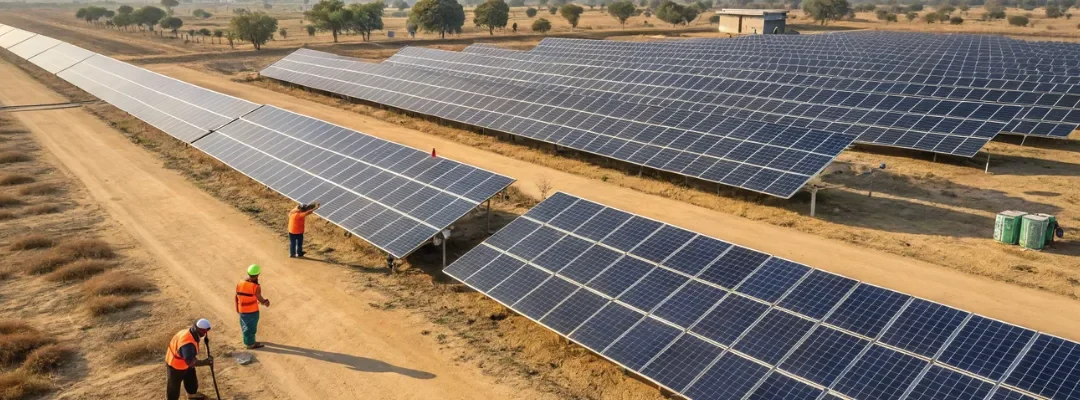India is entering a golden era of solar energy. With 300+ sunny days a year, falling solar panel prices, and government initiatives like PM-KUSUM and net metering, it’s never been easier — or smarter — to earn passive income by harnessing sunlight.
Whether you have a rooftop, farmland, or some investment capital, there’s a solar business model that suits your lifestyle and offers long-term, hands-free returns.
Here are eight powerful ways to turn solar energy into reliable income in 2026.
1. Lease Your Land for Solar Power Projects
Own underused land? You can lease it to solar developers who will install solar farms and pay you fixed rent for 20–25 years.
How It Works:
- You sign a long-term lease with a solar EPC (Engineering, Procurement, Construction) company.
- They handle permits, installation, and operations.
- You earn passive rent — no maintenance required.
Potential Income:
₹30,000–₹1,00,000 per acre per year (depends on location and grid connectivity).
Why It’s Great:
- Zero upfront cost
- Stable, inflation-proof income
- Land remains yours
2. Rooftop Solar + Net Metering: Earn & Save Monthly
Have a rooftop? Use it to slash your electricity bill and earn money by selling extra power to the grid via net metering.
Quick Facts:
- A 5kW system can save ₹6,000–₹8,000/month
- Govt. subsidies cover up to 40% of installation cost
- Payback period: 4–5 years
Best for: Homeowners, small businesses, and housing societies.
Pro tip: Use solar calculators to estimate your savings and ROI before installing.
3. PM-KUSUM Scheme: Solar Income for Farmers
The PM-KUSUM scheme empowers Indian farmers to set up decentralized solar power plants.
Options:
- Install solar pumps for irrigation.
- Build small solar plants (0.5–2 MW) on farmland.
- Sell unused power to DISCOMs at fixed feed-in tariffs.
Potential Return: ₹1–₹2 lakh per acre annually
Bonus: Dual-use of land (solar + agriculture = agrivoltaics)
Learn more: MNRE’s PM-KUSUM Page
4. Join a Solar Co-Investment or Community Project
Don’t have a rooftop or land? No problem. Invest in community solar parks or shared solar farms.
How it Works:
- Pool funds with others to fund a solar plant.
- Receive profit share from electricity sales (PPA or grid supply).
Best for: NRIs, climate-conscious investors, and passive income seekers.
5. Set Up a Solar-Powered EV Charging Station
With EV adoption rising fast, solar-powered charging stations are becoming highly lucrative.
Setup Components:
- Rooftop or ground-mount solar panels
- EV charging infrastructure
- Grid backup (optional)
Revenue Streams:
- Pay-per-use charging fees
- Monthly subscription models
Ideal Locations: Highways, tech parks, malls, gated communities
6. Rooftop PPAs for Commercial Buildings
Own a warehouse, factory, or office building with unused roof space? Monetize it by signing a Power Purchase Agreement (PPA) with a solar company.
Key Benefits:
- You get rental income or revenue share
- No capital expenditure required
- Boosts your ESG/sustainability profile
Example: A 100kW rooftop system can generate ₹10–₹15 lakh/year in power value.
7. Lease Solar Equipment to EPC Companies
If you have funds but no space, invest in solar hardware (panels, batteries, inverters) and lease them to EPCs or solar startups.
Why This Works:
- Fixed lease income
- Asset-based investment with rising demand
- Works well in areas where capital is needed but infrastructure is limited
Tip: Work with verified EPCs or energy startups to reduce risk.
8. Solar-Powered Water & Irrigation Solutions
Demand is booming for solar irrigation pumps, especially in water-scarce rural India.
Business Model:
- Offer solar pump systems on rent or pay-per-use to nearby farmers.
- Use government subsidies (MNRE & state-level) to reduce setup cost.
Best For: Agri-entrepreneurs, cooperatives, or farm equipment renters.
Why Solar is the #1 Passive Income Source for 2026
Predictable ROI: Solar panels last 20–26 years
Low Maintenance: Minimal ongoing costs
Government Support: Strong incentives & policies
Eco-Friendly: Earn while reducing carbon emissions
Scalable: Start small, grow over time

